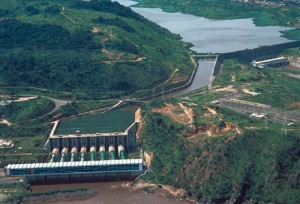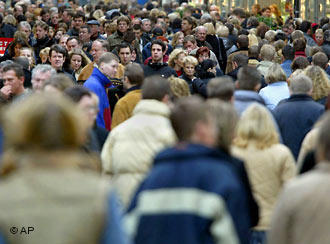Hydropower Goes Big

South Africa and the Democratic Republic of Congo have signed a pretty impressive agreement: together they want to develop the biggest hydropower project in the world. It’ll be called the Grand Inga project (because it will be built on the Inga falls), and the president’s office in South Africa says it has an estimated capacity of 40,000 megawatts.
It’s not expected to be completed until 2025 and cost a lot of money, but offiicials in both countries believe investment in the future of clean energy is crucial. And it could completely change Africa’s energy sector. The Grand Inga project alone could reportedly bring energy to almost half of the population across Africa. And with more than 1 billion people living across the continent, that’s a pretty astonishing feat.
Bonn’s Climate Conference

The Bonn 2011 Nexus Conference kicked off today in the city of Bonn! The conference title is The Water Energy and Food Security Nexus – Solutions for the Green Economy,” organized by the German government. Over the next three days, more than 500 experts, officials, academics and activists from around the world will meet to talk about the growing crises in food, water and energy security – especially as the population keeps growing so fast.
The conference participants will focus on three different dimensions: social, economic and ecologic. Basically, the group wants to develop policy ideas and launch concrete initiatives in food, water and energy efficiency: how to create more resources with less, how to invest in sustainable ecosystem services and how to make resources available to everyone.
![]()
The website for the conference has lots of info on the issues at hand, plus a breakdown of who is speaking, what the program is and what the participants hope to acheive. You can even follow along on some of the panel discussions with a live stream. There’s even a Nexus blog with the latest info and analysis.
The conference is especially important with the UN climate talks in Durban looming just around the corner and the Rio 2012 UN conference on sustainable development. Hope you tune in if you can…
Come to Germany for one year
 You want to make the combat against climate change your profession? You are from a developing or recently industrialised country? You feel like living and working in Germany for one year?
You want to make the combat against climate change your profession? You are from a developing or recently industrialised country? You feel like living and working in Germany for one year?
If the answer to the above questions is yes, you should apply now for the International Climate Protection Fellowship. It is financed by the German Ministry for the Environment (BMU). Applications are accepted until 15 December 2011.
If you apply or think about applying, please let us and others know your thoughts about the climate fellowship. Leave your comment on this Blog or on our Facebook page.
A more detailled description of the fellowship programme can be found on the homepage of the Germin Ministry for the Environment.
7 billion, and counting
There are now more than 7 billion people living on our planet! It’s a reason to celebrate and a stark reminder of how many people live and depend on the planet’s resources. Human population looks like it will continue to grow at breakneck speed, and that means it’s vital we make sure the earth can meet the needs of all 7, 8 or even 9 billion people – when we get to that point.
Climate change poses the biggest threat to meeting the basic food supply needed to nourish the world. Severe weather, changing rain trends and other turnarounds in global climate patterns have put important basic crops at risk – from wheat and corn to coffee. As the supply falls, the prices for food soar, making it too expensive for many in the world’s developing countries.
On top of that, more people means more energy use, and the need for clean, eco-friendly energy on a wide scale will become even more crucial in the coming years. So you’re now one of more than 7 billion people on the planet. What can every person do to keep the world safe?
Energy from…what?
We all know it’s possible to get energy from natural resources like the sun, wind, water, heat, etc. And we know about other interesting sources of energy too, like manure, food scraps, even kitchen grease. But over the years, people have come up with more unusual and just downright odd sources of energy that might surprise you.
Like the company Super Faiths in Japan – they recycle used elderly diapers into – yes, diapers – into fuel for biomass stoves. It may seem strange, but Japan’s population is aging rapidly, and Super Faiths says it’s making use of a ready source of energy. The used diapers are processed in special recycle machines that sterilize, dry and shred the diapers and turn them into fuel pellets.
Another unique source of energy? Confiscated alcohol. A Swedish biogas company called Svensk Biogas AB turns illegal booze into fuel for trucks, buses and trains. And there’s plenty of material to work with: Swedish authorities confiscate hundreds of thousands of liters of alcohol from smugglers every year. Instead of pouring it down the drain, Svensk Biogas AB puts it to good use and helps Sweden reduce its dependency on harmful fossil fuels. Who knew?










Feedback